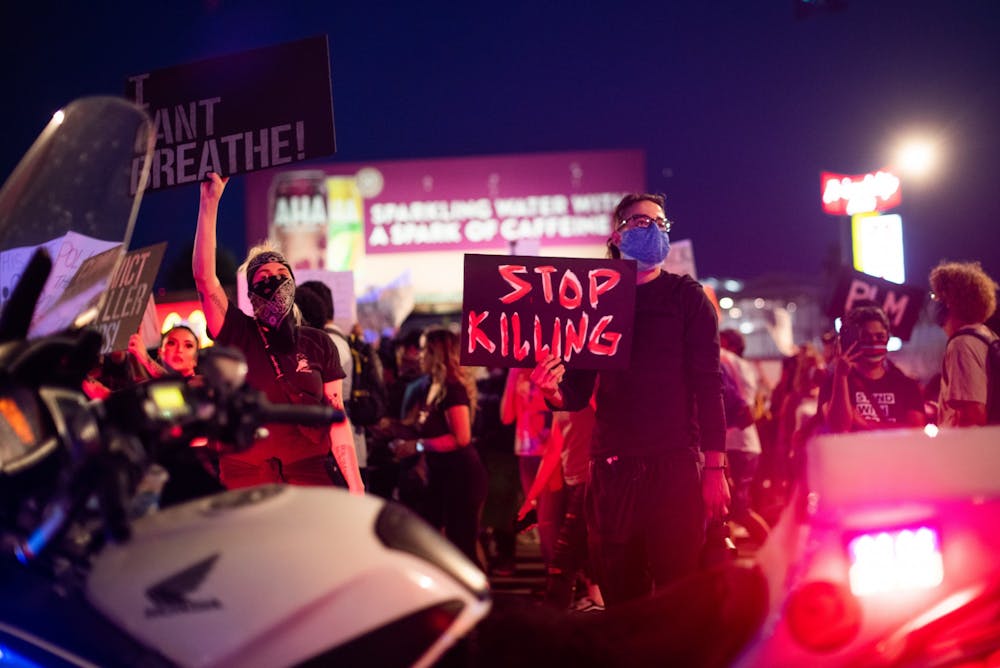Hundreds of protesters gathered in downtown Phoenix, marching from City Hall to the state Capitol and police headquarters, joining nationwide protests Thursday night following the death of George Floyd, a 46-year-old Black man who was killed by police in Minneapolis Monday.
What started as a relatively peaceful protest around 7 p.m. grew more tense as upset protesters threw rocks and water bottles at police around 10 p.m.
Before the protest began, ASU student groups voiced disdain for the death of Floyd and the federal government's response, specifically in Minneapolis.
"The murder of George Floyd is the most recent in a long history of police violence against Black Americans," said Daniel Lopez, treasurer of Students for Socialism at ASU and a senior studying philosophy and political science.
"What happened to George Floyd is completely unacceptable but has unfortunately become the norm for law enforcement in America," said David Howman, president of ASU College Libertarians and a graduate student studying justice studies.
Floyd's arrest was captured on video and has since prompted outrage across the U.S., resulting in on-going protests in Minneapolis since Tuesday and protests beginning in Denver, Los Angeles and other cities.
"It's a civic responsibility to show up and speak out against this behavior, because it's not just an isolated issue but something America deals with everywhere. Protesting is the correct response to this miscarriage of justice," Howman said.
At one point, the back window of a police SUV was smashed by protesters. Around 9:40 p.m. and throughout the rest of the protest, police used nonlethal force, including what protesters said was pepper spray, bean bag rounds and pepper balls.
Speeches at the protest demanded officer Derek Chauvin, who suffocated Floyd by kneeling on his neck for over eight minutes, be arrested for murder.
Chauvin was arrested Friday morning and charged with third degree murder and manslaughter.
Chants of "hands up, don't shoot" and "say his name" rang through downtown as protest leaders described the death of Antonio Arce at the hands of police officers who received no charges at the start of the year.
Later, protesters began throwing more water bottles, rocks and other items at police headquarters and police dressed in riot gear began trying to disperse the crowd.
The protest was declared an unlawful assembly around 11 p.m., but protesters held their ground near 7th Avenue responding with chants of "I can't breathe," words Floyd said as his neck was pushed to the ground during his arrest.
To move protesters away from police headquarters, police began to deploy OC Spray, bean bag rounds, and pepper balls, according to a statement from the Phoenix Police Department.
At a press conference Friday, Phoenix police Chief Jeri Williams said the police support people's right to protest peacefully, but added that when things turn criminal, the police will respond accordingly.
"We cannot and will not tolerate criminal activity," Williams said.
According to Sgt. Mercedes Fortune, one protester was sent to the hospital by ambulance and eight others were arrested, according to a statement.
Phoenix Mayor Kate Gallego released a statement Friday, saying her job during protests is to listen to people who "are right to stand up and demand change."
"We must have high standards for all public servants, including law enforcement," Gallego wrote in the statement. "I ask residents to continue to look out for one another and recognize that hurt begets hurt."
The protest in Phoenix, called "Stand with Minneapolis: Justice for George Floyd," was organized by All Black Lives Matter Arizona to "show solidarity and support for the Floyd Family," a Facebook event post for the protest said.
The four police officers involved in the arrest leading to Floyd's death were fired by the Minneapolis Police Department, but at the time of the protest, none had been arrested.
The Star Tribune reported Wednesday night's protests "began peacefully and escalated into gunfire and arson, with about 30 buildings reported ablaze, and countless others damaged."
The Phoenix event post told attendees to bring signs, bullhorns, water, friends and neighbors "because what happened in Minneapolis could happen here, has happened here, and will happen here again and in other places so long as we remain silent and submissive."
The Black Lives Matter Phoenix Metro group urged people not to attend the protest, as the group "is not associated with 'All Black Lives Matter Arizona' ... nor Jarrett Maupin."
Maupin is a controversial figure, especially in situations involving police. Students urged their peers to not attend the protest. In April 2019, The State Press reported that an apology for racist and homophobic posts, which was organized by Maupin, was staged with College Republicans United at ASU.
Members of ASU student groups have commented on Floyd's death, with some supporting charges against the police officers involved in the killing. ASU Students for Socialism participated in the protest.
Justin Remelius, Chair of Young Democratic Socialists of America ASU and a senior studying philosophy and political science, urged people not to attend the protest and instead donate to support the cause.
Joe Pitts, president of ASU College Republicans and a sophomore studying business law said that he is "proud" of cops who follow the rules and serve communities, but the officers involved in the killing should face charges for the wrongful murder.
"How many more people of color have to be murdered before we start holding people accountable?" Howman said.
Andrew Howard contributed reporting.
Reach the reporters at pjhanse1@asu.edu and wmyskow@asu.edu and follow @piperjhansen and @wmyskow on Twitter.
Like The State Press on Facebook and follow @statepress on Twitter.

Wyatt Myskow is the project manager at The State Press, where he oversees enterprise stories for the publication. He also works at The Arizona Republic, where he covers the cities of Peoria and Surprise.

Piper Hansen is the digital editor-in-chief at The State Press, overseeing all digital content. Joining SP in Spring 2020, she has covered student government, housing and COVID-19. She has previously written about state politics for The Arizona Republic and the Arizona Capitol Times and covers social justice for Cronkite News.




